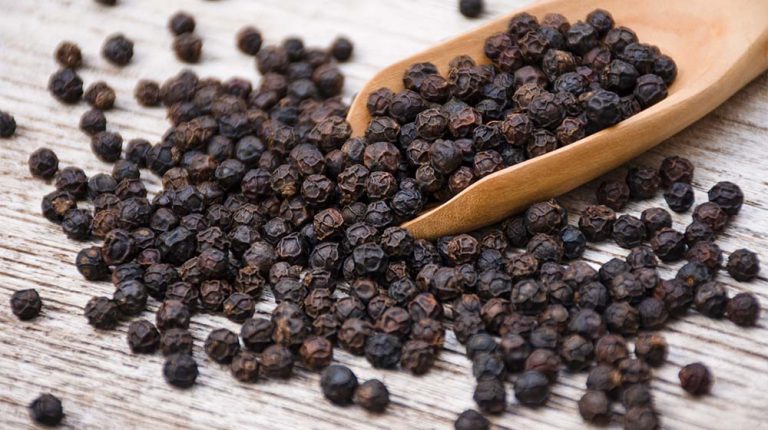
Hormone Health TRT

Black pepper is a staple seasoning in kitchens around the globe. But did you know that this versatile spice may also lead to better health? Black pepper owes its unique flavor—and health benefits—to its main ingredient: piperine.
Before you cover your next dish in pepper (because really, we all prefer just a pinch), there might be a better way to take advantage of this bioactive compound. Try BioPerine, an easy-to-use supplement that is packed with piperine.
Let's TalkBioPerine is a patented, synthetic extract of piperine. It contains at least 95% of the bioactive ingredient in a form that your body can easily absorb. Ideal for pairing with nutrients like curcumin, BioPerine is a great way to boost your intake of the black-pepper magic ingredient.
BioPerine is not the same as black pepper, the same way a vitamin C tablet is not the same as oranges. They do, however, have comparable effects.
Black pepper is a natural, raw spice that contains a health-beneficial ingredient: piperine. BioPerine is a patented supplement designed to deliver a standardized, high concentration of piperine.
The benefits of BioPerine are numerous. It is a great way to boost your intake of piperine and improve nutrient absorption, enhance metabolism, reduce inflammation, and fight microorganisms. It might even block the growth of cancer cells.
Piperine is a powerful molecule with diverse effects on the human body. Here is a breakdown of the most important BioPerine benefits for your health:
Piperine is a bioenhancer, a substance able to increase the absorption and bioavailability of other nutrients. For example, it can boost the absorption of curcumin, an anti-inflammatory bioactive ingredient found in turmeric, by up to 2,000%.1
Studies have found piperine also to enhance the absorption of beta carotene, selenium, vitamin C, vitamin B6, coenzyme Q10, and many other nutrients.2
Some studies indicate that BioPerine supplementation may help blood sugar management through different mechanisms.
Researchers speculate that piperine may reduce blood sugar levels by increasing the uptake of sugar by the cells, as well as enhance the effectiveness of the anti-diabetes drug metformin.3,4 Moreover, it may prevent the development of insulin resistance, a condition in which cells become immune to the effects of insulin and refuse to take up more sugar from the blood.5,6
Given its antioxidant properties, some studies suggest that BioPerine might prevent the growth, division, and spread of cancer cells.7 Another study showed that the supplement may promote the efficacy of a therapy used in the treatment of particularly aggressive breast cancer.8
BioPerine holds great promise to minimize inflammation. A study found piperine extract to protect skin cells against damage and inflammation caused by exposure to ultraviolet (UV) radiation.9
Another study revealed the powerful molecule may reduce the production of diverse markers of inflammation in brain and spinal cord cells.10 Moreover, it may be beneficial in the treatment of inflammatory conditions such as asthma and arthritis.11,12
BioPerine may not only be a dietary supplement but also a powerful antimicrobial agent. Researchers found piperine to damage viral proteins and thus inhibit the activity of many viruses, as well as significantly enhance the effectiveness of antibiotics such as ciprofloxacin by damaging the cell membrane of bacteria.13
A few animal studies show that BioPerine may promote brain health and reduce the risk of developing several neurological conditions.
Piperine may decrease brain cell inflammation in mice models of Parkinson’s disease, as well as have a protective effect on cognitive abilities in Alzheimer’s disease. Moreover, it may improve memory and protect against damage to the nerve fiber protective layer called the myelin sheath.
BioPerine may increase your metabolic rate by promoting the activity of enzymes involved in the metabolism of fat and carbohydrates, which results in higher energy production or thermogenesis.14 It may also stimulate this process by activating the thermogenic receptors, as well as enhancing the absorption of nutrients that your body needs to create energy.15
Hemoglobin is a protein that carries oxygen in red blood cells. Besides protein, a portion of hemoglobin contains iron. Research conducted in humans suggests that BioPerine may increase the absorption of iron and thus, increase the levels of hemoglobin.16
BioPerine is a supplement that might carry numerous benefits for your health. It is a reliable source of piperine, an extract found in black pepper, which helps enhance nutrient absorption, stabilize blood sugar levels, combat cancer cell growth, decrease inflammation, and boost brain function.
The introduction of a new supplement should not be taken lightly. Contact Opt Health physicians with any questions about BioPerine, its side effects, potential drug interactions, and your unique health optimization journey.
BioPerine may boost your nutrient absorption, enhance metabolism, help with blood sugar management, prevent cancer growth, reduce inflammation, fight microbes, reduce your risk of developing a neurological condition, and increase your hemoglobin levels.
BioPerine has few side effects. However, some reports suggest that piperine could reduce the speed of blood clotting.17 For that reason, BioPerine should be avoided by people with bleeding disorders or those planning to have surgery.
BioPerine is a dietary supplement. As with any other form of supplementation, it is not a substitute for having a balanced diet and it is not necessary for good health outcomes. However, its use may ensure a sufficient intake of piperine and provide meaningful health benefits.
No direct evidence suggests that BioPerine causes weight gain. In fact, in combination with curcumin, piperine is more commonly associated with potential benefits for weight management.18
1. Hewlings SJ, Kalman DS. Curcumin: A Review of Its’ Effects on Human Health. Foods. 2017;6(10):92. doi:10.3390/foods6100092
2. Chopra B, Dhingra AK, Kapoor R, Prasad D. Piperine and Its Various Physicochemical and Biological Aspects: A Review. Open Chem J. 2016;3:75-96. doi:10.2174/1874842201603010075
3. Atal S, Atal S, Vyas S, Phadnis P. Bio-enhancing Effect of Piperine with Metformin on Lowering Blood Glucose Level in Alloxan Induced Diabetic Mice. Pharmacogn Res. 2016;8(1):56-60. doi:10.4103/0974-8490.171096
4. Maeda A, Shirao T, Shirasaya D, et al. Piperine Promotes Glucose Uptake through ROS-Dependent Activation of the CAMKK/AMPK Signaling Pathway in Skeletal Muscle. Mol Nutr Food Res. 2018;62(11):e1800086. doi:10.1002/mnfr.201800086
5. Choi S, Choi Y, Choi Y, Kim S, Jang J, Park T. Piperine reverses high fat diet-induced hepatic steatosis and insulin resistance in mice. Food Chem. 2013;141(4):3627-3635. doi:10.1016/j.foodchem.2013.06.028
6. Liu C, Yuan Y, Zhou J, Hu R, Ji L, Jiang G. Piperine ameliorates insulin resistance via inhibiting metabolic inflammation in monosodium glutamate-treated obese mice. BMC Endocr Disord. 2020;20:152. doi:10.1186/s12902-020-00617-1
7. Manayi A, Nabavi SM, Setzer WN, Jafari S. Piperine as a Potential Anti-cancer Agent: A Review on Preclinical Studies. Curr Med Chem. 2018;25(37):4918-4928. doi:10.2174/0929867324666170523120656
8. Abdelhamed S, Yokoyama S, Refaat A, et al. Piperine enhances the efficacy of TRAIL-based therapy for triple-negative breast cancer cells. Anticancer Res. 2014;34(4):1893-1899.
9. Jaisin Y, Ratanachamnong P, Wongsawatkul O, Watthammawut A, Malaniyom K, Natewong S. Antioxidant and anti-inflammatory effects of piperine on UV-B-irradiated human HaCaT keratinocyte cells. Life Sci. 2020;263:118607. doi:10.1016/j.lfs.2020.118607
10. Wang-Sheng C, Jie A, Jian-Jun L, Lan H, Zeng-Bao X, Chang-Qing L. Piperine attenuates lipopolysaccharide (LPS)-induced inflammatory responses in BV2 microglia. Int Immunopharmacol. 2017;42:44-48. doi:10.1016/j.intimp.2016.11.001
11. Kim SH, Lee YC. Piperine inhibits eosinophil infiltration and airway hyperresponsiveness by suppressing T cell activity and Th2 cytokine production in the ovalbumin-induced asthma model. J Pharm Pharmacol. 2009;61(3):353-359. doi:10.1211/jpp/61.03.0010
12. Umar S, Golam Sarwar AHM, Umar K, et al. Piperine ameliorates oxidative stress, inflammation and histological outcome in collagen induced arthritis. Cell Immunol. 2013;284(1-2):51-59. doi:10.1016/j.cellimm.2013.07.004
13. Khan IA, Mirza ZM, Kumar A, Verma V, Qazi GN. Piperine, a Phytochemical Potentiator of Ciprofloxacin against Staphylococcus aureus. Antimicrob Agents Chemother. 2006;50(2):810-812. doi:10.1128/AAC.50.2.810-812.2006
14. Nogara L, Naber N, Pate E, Canton M, Reggiani C, Cooke R. Piperine’s mitigation of obesity and diabetes can be explained by its up-regulation of the metabolic rate of resting muscle. Proc Natl Acad Sci U S A. 2016;113(46):13009-13014. doi:10.1073/pnas.1607536113
15. Dudhatra GB, Mody SK, Awale MM, et al. A Comprehensive Review on Pharmacotherapeutics of Herbal Bioenhancers. Sci World J. 2012;2012:637953. doi:10.1100/2012/637953
16. Fernández-Lázaro D, Mielgo-Ayuso J, Córdova Martínez A, Seco-Calvo J. Iron and Physical Activity: Bioavailability Enhancers, Properties of Black Pepper (Bioperine®) and Potential Applications. Nutrients. 2020;12(6):1886. doi:10.3390/nu12061886
17. Zayed A, Babaresh WM, Darweesh RS, El-Elimat T, Hawamdeh SS. Piperine Alters the Pharmacokinetics and Anticoagulation of Warfarin in Rats. J Exp Pharmacol. 2020;12:169-179. doi:10.2147/JEP.S257919
18. Miyazawa T, Nakagawa K, Kim SH, et al. Curcumin and piperine supplementation of obese mice under caloric restriction modulates body fat and interleukin-1β. Nutr Metab. 2018;15(1):12. doi:10.1186/s12986-018-0250-6
Your health, your terms. Discover how personalized care can transform not just the way you feel, but how you live.